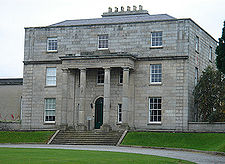.gif)
Richard Moore (Irish lawyer)
Encyclopedia

Privy Council of Ireland
The Privy Council of Ireland was an institution of the Kingdom of Ireland until 31 December 1800 and of the United Kingdom of Great Britain and Ireland 1801-1922...
(d. 1858) was an Irish lawyer and judge.
Moore was Attorney-General for Ireland
Attorney-General for Ireland
The Attorney-General for Ireland was an Irish and then United Kingdom government office. The holder was senior to the Solicitor-General for Ireland, and advised the Crown on Irish legal matters...
during part of Lord John Russell
John Russell, 1st Earl Russell
John Russell, 1st Earl Russell, KG, GCMG, PC , known as Lord John Russell before 1861, was an English Whig and Liberal politician who served twice as Prime Minister of the United Kingdom in the mid-19th century....
's Whig Government 1846-1852
Whig Government 1846-1852
Following the split in the Tory Party over the Corn Laws in 1846 and the consequent end of Sir Robert Peel's second government, the Whigs came to power under Lord John Russell...
, holding that office from 16 July 1846 to 21 December 1847. He was then appointed as a judge of the Irish Queen's Bench
King's Bench
The Queen's Bench is the superior court in a number of jurisdictions within some of the Commonwealth realms...
and remained a judge until his death. He was one of the Special Commission judges appointed for the trial in which William Smith O'Brien
William Smith O'Brien
William Smith O'Brien was an Irish Nationalist and Member of Parliament and leader of the Young Ireland movement. He was convicted of sedition for his part in the Young Irelander Rebellion of 1848, but his sentence of death was commuted to deportation to Van Diemen's Land. In 1854, he was...
was convicted of high treason
High treason
High treason is criminal disloyalty to one's government. Participating in a war against one's native country, attempting to overthrow its government, spying on its military, its diplomats, or its secret services for a hostile and foreign power, or attempting to kill its head of state are perhaps...
for his part in the Young Irelander Rebellion of 1848
Young Irelander Rebellion of 1848
The Young Irelander Rebellion was a failed Irish nationalist uprising led by the Young Ireland movement. It took place on 29 July 1848 in the village of Ballingarry, County Tipperary. After being chased by a force of Young Irelanders and their supporters, an Irish Constabulary unit raided a house...
(The Queen v O'Brien (1849) 3 Cox C.C. 360). O'Brien's death sentence was commuted to one of transportation and he received an unconditional pardon in 1856, after which he returned to Ireland.
From 1840 until his death Moore lived in Rathfarnham
Rathfarnham
Rathfarnham or Rathfarnam is a Southside suburb of Dublin, Ireland. It is south of Terenure, east of Templeogue, and is in the postal districts of Dublin 14 and 16. It is within the administrative areas of both Dun Laoghaire-Rathdown and South Dublin County Councils.The area of Rathfarnham...
, Dublin,secondary school for boys founded by Padraic Pearse. The house and grounds have been owned by the State since 1968 and the house is now the Pearse Museum
Pearse Museum
The Pearse Museum is dedicated to the memory of Patrick Pearse and his brother, William. Patrick Pearse was an educationalist and nationalist who was executed for his part in the 1916 Rising. It is situated in the suburb of Rathfarnham on the south side of Dublin, Ireland.It was formerly an Irish...
(Healy (2004) p 197.)

